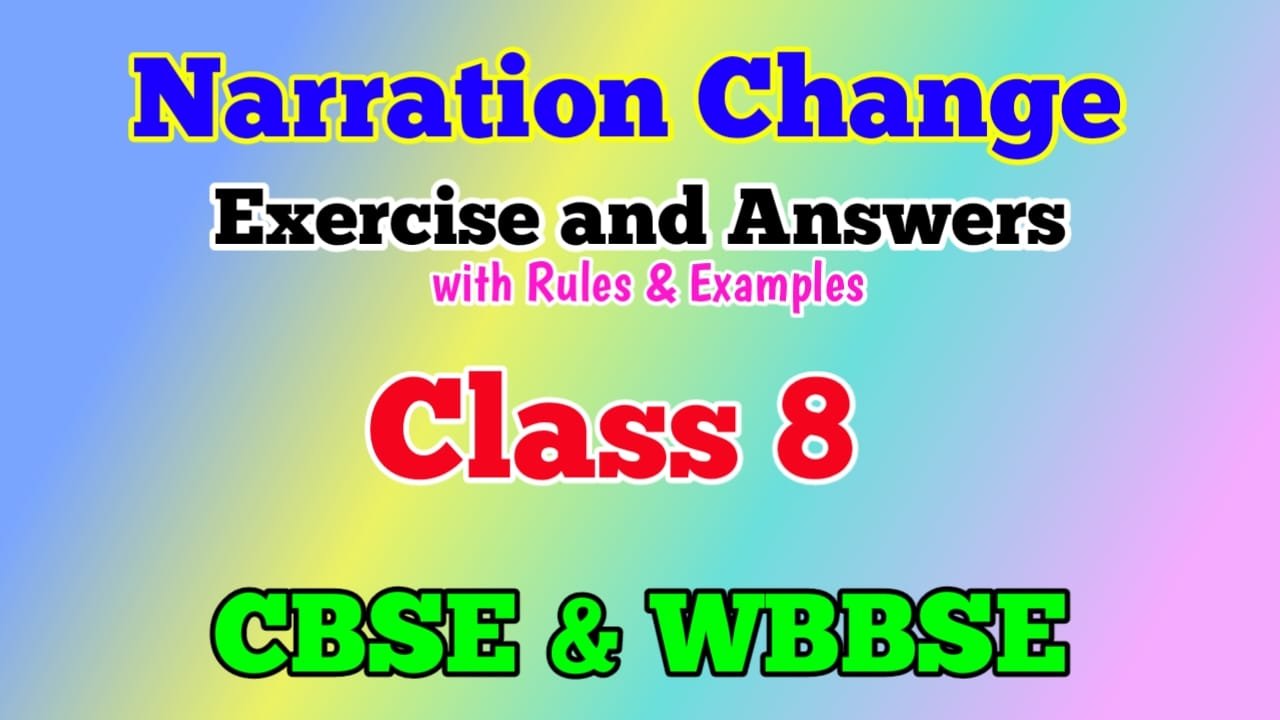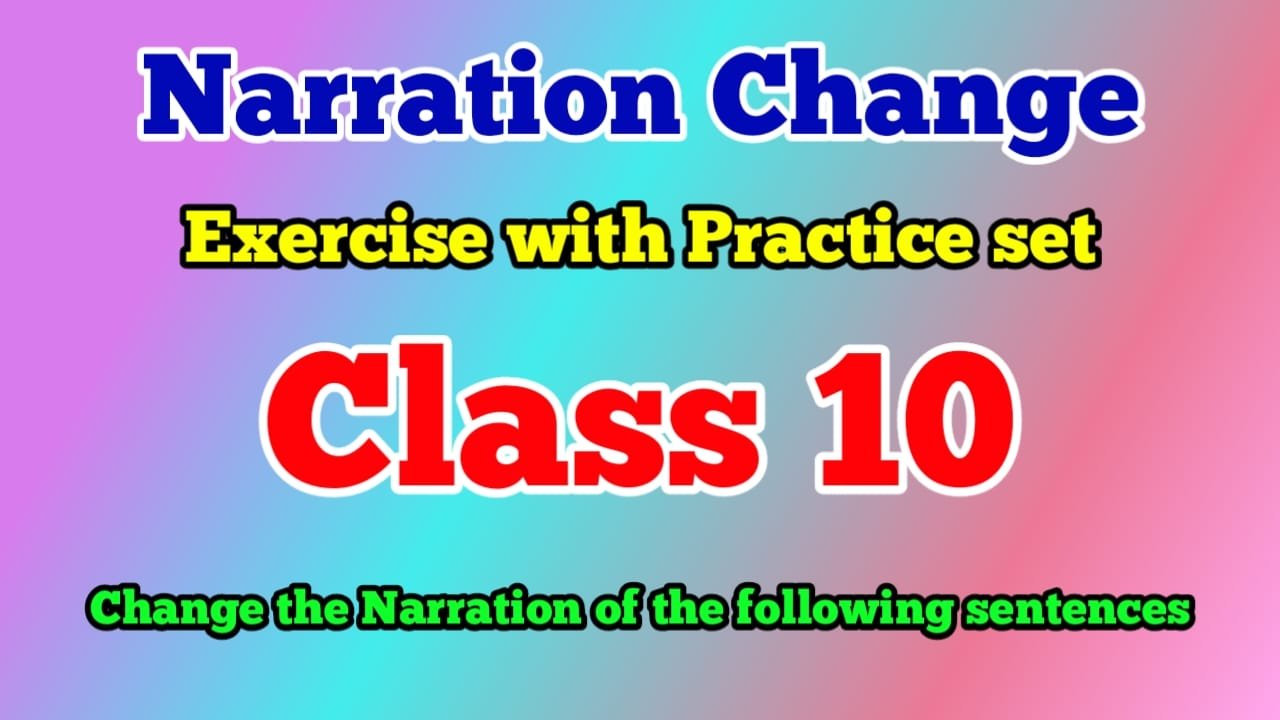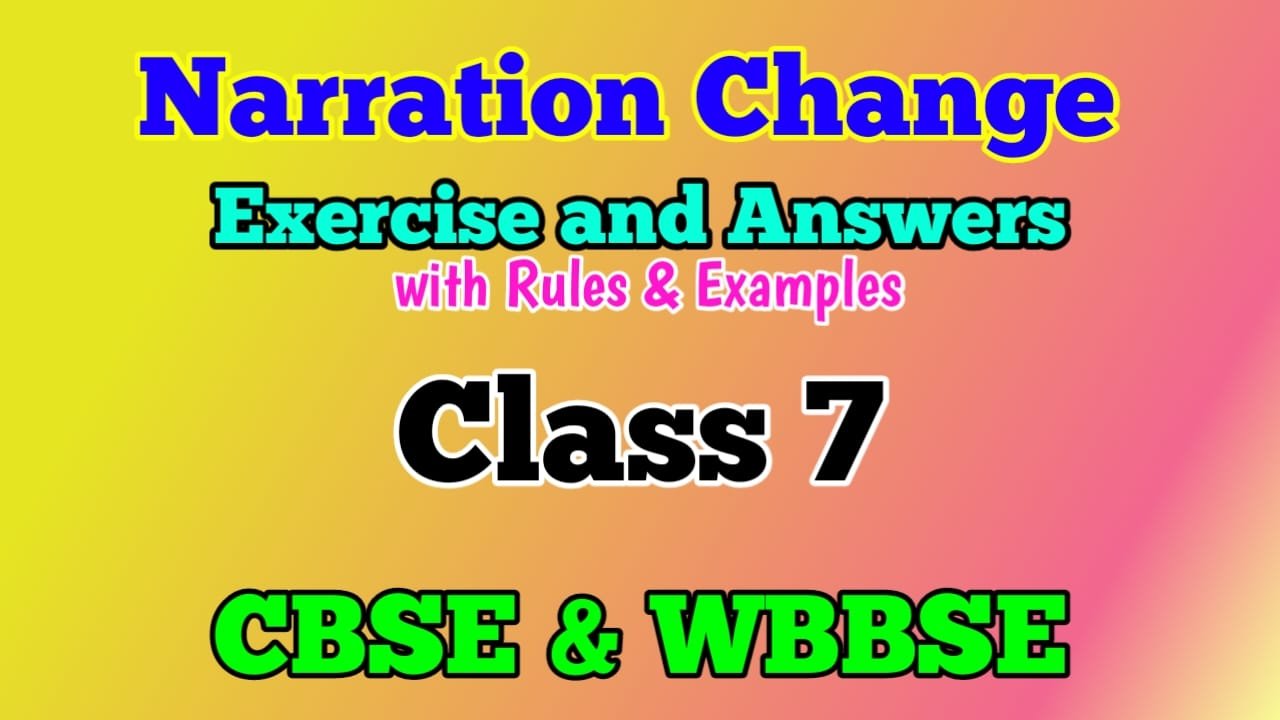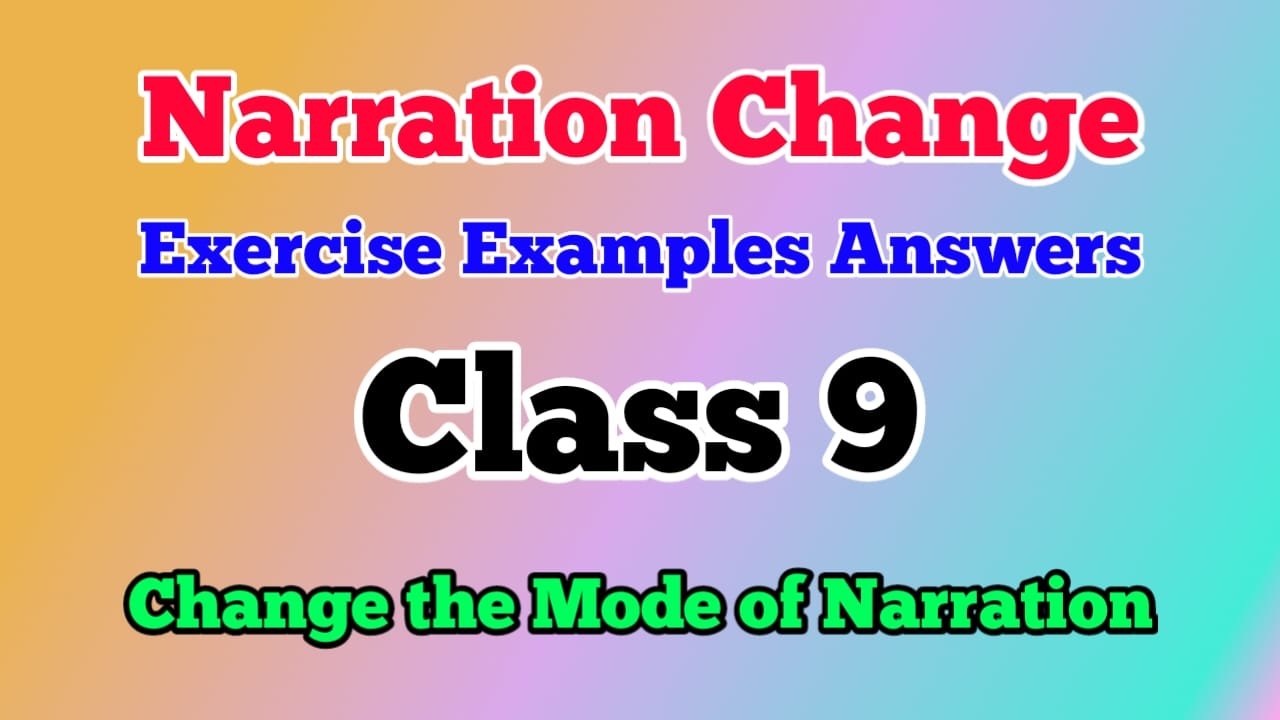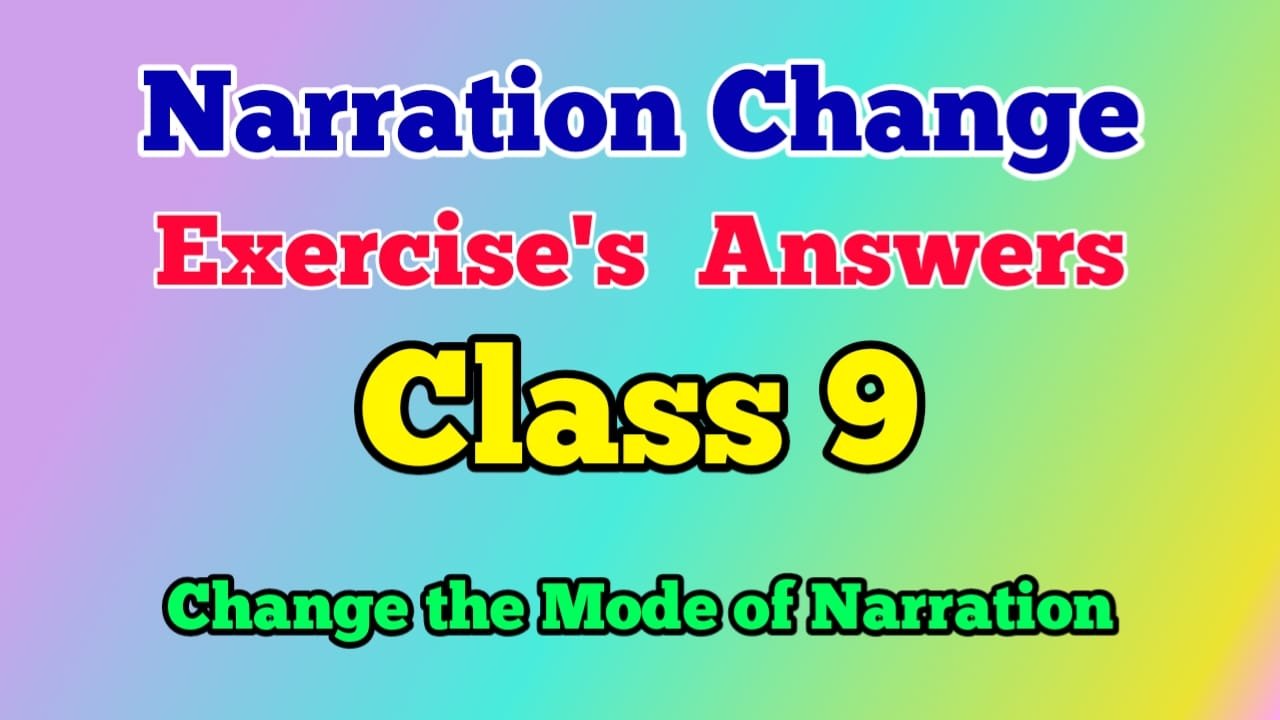Discover the narration change class 8 rules with examples and exercises and learn how to change from Direct speech to Indirect Speech. Class 8 Narration rules with examples and exercises have been arranged in the following with our comprehensive guide, complete with examples and exercises.
Narration Change Class 8
Narration Change means to change the speech of the speaker either from Direct to Indirect or from Indirect to Direct. When we quote the actual words of the speaker, it is called Direct Narration. But when someone narrates the speaker’s speech indirectly keeping the meaning the same, it is called Indirect Narration. For examples,
- Direct: Debi says, “I pray to God.”
- Indirect: Devi says that she prays to God.
We sometimes need to change the speaker’s actual words indirectly keeping the meaning the same or vice versa. This needs to change Direct Narration to Indirect Narration or Indirect to Direct. In order that we must know some rules to keep meaning the same.
People also search
| Narration Change Class 5 | Narration Change Class 8 |
| Narration Change Class 6 | Narration Change Class 9 |
| Narration Change Class 7 | Narration Change Class 10 |
Rules of Narration Change Class 8
The following Narration Change Rules must be observed carefully.
Rule 1: Change of Tense
1. If the reporting verb is in the Present or Future tense (e.g. say, will say) there is no change in the tense of the verb in the Indirect Speech. For Example,
- Direct: Sabita says (present), ” I can do (present) the sum.”
- Indirect: Sabita says (present) that she can do (present) the sum.
- They will say (Future), “He could drive (Past) the car”
- They will say (Future) that he could drive (Past) the car.
2. If the Reporting verb is in the Past Tense, the tense of the verb in the reported speech or indirect speech must be generally changed.
Present Tense in the direct becomes Past Tense.
- Direct: He said, “I write a letter.”
- Indirect: He said that he wrote a letter
Past Tense becomes Past Perfect or remains Unchanged
- Direct: Ruby said, “I bought a pen yesterday.”
- Indirect: Ruby said that he had bought a pen the previous day.
Present Continuous becomes Past Continuous
- Direct: He said, “I am going to church.”
- Indirect: He said that he was going to church.
Past Continuous becomes Past Perfect Continuous
- Direct: Mohan said I was playing cricket
- Indirect: Mohan said that he had been playing cricket
Present Perfect becomes Past Perfect
- Direct: Kunal said, “I have done my homework.”
- Indirect: Kunal said that he had done his homework.
Present Perfect Continuous becomes Past Perfect Continuous
- Direct: Anita said I have been reading a novel
- Indirect: Anita said that she had been reading a novel
“will” and “shall” becomes ‘would’
“May”, becomes “might”
“Can”, becomes “Could”
“Must” becomes “must” or “had to”
Rule 2: Change of Pronouns
The First Person Pronouns in the “reported speech” or “Quoted Speech” are put into the same person as “the subject of the reporting Verb.”
- He said, “I worked hard.”
- He said that he had worked hard.
The Second Person Pronouns in the “reported speech” or “Quoted Speech” are put into the same person as “the indirect object of the reporting Verb.”
- I said to her, “You are idle in your office.”
- I told her that she was idle in her office.
The Third Person Pronouns in the “reported speech” or “Quoted Speech” remain in the “Third Person.”
- I said, “He will not wait for his friend.”
- I said that he would not wait for his friend.
Narration Change Class 8 Rules for Assertive Sentence:
1. No comma (, ) after the Reporting verb in Indirect Speech.
2. The full stop ( . ) at the end of the sentence in indirect speech.
3. Reporting verbs in Direct Speech (say/said/say to you / said to me) will be changed into (say/said/tell you / told me) in Indirect Speech.
4. Connective ‘that’ is to add between Reporting Verb and Direct Speech in Indirect Narration.
Examples of Narration Change Class 8 Assertive Sentences
Direct Speech: He said to me, “You are ill”
| Speaker (Subject) | Reporting Verb | Spoken to (Object) | Reported Speech |
| He | said to | me | “You are ill” |
Indirect Speech: He told me that I was ill.
| Speaker (Subject) | Reporting Verb | Spoken to (Object) | Connective | Reported Speech |
| He | told | me | that | I was ill. |
Assertive Sentence Workout Examples
Change the mode of Narration of the following sentences.
1. He says, “I shall help the poor.”
Ans: He says that he will help the poor.
2. You will say, “I do not take tea.”
Ans: You will say that you do not take tea.”
3. They said, “We are not afraid.”
Ans: They said that they were not afraid.
4. She said, “I am working in the garden.”
Ans: She said that she was working in the garden.
5. You said to me, “I have sold a bicycle.”
Ans: You told me that you had sold a bicycle.
6. I said to Mitali, “You misunderstand me.”
Ans: I told Mitali that she misunderstood me.
Q 7. We said to them, “We will help you.”
Ans: We told them that we would help them.
Q 8. Reba said to Rajib, “You are working very sincerely.”
Ans: Reba told Rajib that he was working very sincerely.
Assertive Sentences Exercises & Answers
Change the mode of Narration of the following sentences.
1. Sima told me that she had given me a pen the previous day.
Ans: Sima said to me, “I gave you a pen yesterday.”
2. They said that they were happy then.
Ans: They said. “We are happy now.”
3. The teacher said that man is mortal.
Ans: The teacher said, “Man is mortal.”
4. He said that he walks in the morning every day.
Ans: He said, “I walk in the morning every day.”
5. Mantu said that Iron is a very useful metal.
Ans: Mantu said. “Iron is a very useful metal.”
Narration Change Class 8 Rules for Interrogative Sentence:
1. No comma (, ) after the Reporting verb in Indirect Speech.
2. The full stop ( . ) at the end of the sentence in indirect speech.
3. Reporting verbs in Direct Speech (say/said/say to you / said to me) will be changed into (ask/asked/ask you / asked me) in Indirect Speech. Reporting Verbs in Indirect Speech may also be ‘ enquire of ’, or ‘want to know’.
4. Connective ‘if/whether’ is to add between Reporting Verb and Direct Speech in Indirect Narration, if the interrogative sentence is not introduced with interrogative pronouns – who, what, whom, when, why, whose, where, how, etc.
In Indirect speech, the interrogative sentence will turn into an Assertive Sentence. That means the subject will follow the verbs.
Examples of Narration Change Class 8 Interrogative Sentences
Direct Speech: The boy said to me, ‘Will you help me?”
Direct Speech: He said to me, “How old are you?”
| Speaker (Subject) | Reporting Verb | Spoken to (Object) | Reported Speech |
| The boy The man | said to said to | me me | ‘Will you help me?” “How old are you?” |
Indirect Speech: The boy asked me if I would help him.
Indirect Speech: The man asked me how old I was.
| Speaker (Subject) | Reporting Verb | Spoken to (Object) | Connective | Reported Speech |
| The boy The man | asked asked | me me | if how | I would help him. old I was. |
Interrogative Sentence Workout Examples
1. Mother said to my sister, “Will you entertain our guest?”
Ans: Mother asked my sister if she would entertain their guests.
2. The teacher said to the boy, “Have you prepared your lesson?”
Ans: The teacher asked the boy if he had prepared his lessons.
3. Mobarak said to Latif, “Did you go there yesterday?”
Ans: Mobarak enquired of Latif whether he had gone there the previous day.
4. Hema said to Bina, “Are you ill today?”
Ans: Hema asked Bina if she was ill that day.
5. Jyoti said to Moti, “are you weeping?”
Ans: Jyoti asked Moti if she was weeping.
6. Debu said to Apu, “Have you closed the front door before you leave the house?
Ans: Debu asked Apu if he had closed the front door before he left the house.
7. Geeta said to Sumita, “Can you solve this problem?”
Ans: Geeta asked Sumita if she could solve the problem.
8. Haren said to Baren, “When have you come here?’
Ans: Haren asked Baren when he had gone there.
Interrogative Sentences Exercises & Answers
Change the mode of Narration of the following sentences.
1. Dwijen asked Swapan how old he was.
Ans: Dwijen said to Swapan,”How old are you?”
2. Rupa asked Nipa whom she had spoken with the night before.
Ans: Rupa said to Nipa, “Whom did you speak with the last night?”
3. You enquired of me what I wanted from you.
Ans: You said to me, “What do you want from me?”
4. Sipra asked us how long she would wait for our friends to come there.
Ans: Sipra said to us, “How long shall I wait for your friends to come here?”
5. The boy asked me where I lived.
Ans: The boy said to me, “Where do you live?”
6. The teacher asked whose book that was.
Ans: The teacher said, “Whose book is this?”
7. The man asked her whom she wanted to see.
Ans: The man said to her, “Whom do you want to see?”
Narration Change Class 8 Rules for Imperative Sentence:
1. In Indirect Speech, the reporting verb becomes order, request, advise, ask, tell, etc. according to the sense.
2. Infinitive, “to” is used before the main verb in Indirect Speech.
3. In the case of the Negative Imperative, ‘not’ is used before the Infinitive in the Indirect Speech. The verb ‘forbid’, ‘prohibit’, etc may be used and in that case ‘not’ is not used before the Infinitive.
4. The expressions like ‘Sir’ and ‘please’ in Direct Speech are omitted in Indirect Speech and reporting verbs ‘request’, ‘entreat’ etc., and adverbs ‘kindly’, ‘politely’, ‘respectfully’ etc, may be used in their place to express the sense.
An imperative Sentence beginning with ‘Let’
1. ‘Let’ with ‘us’ express ‘ suggestion’, or ‘proposal’– reporting verb in Indirect Speech will be ‘suggest’, ‘propose’; ‘Let’ changed to ‘should’ and placed after subject; connective ‘that’ is used.
2. ‘Let’ with ‘me’, ‘him’, and ‘her’ not express ‘ suggestion’, or ‘proposal’ – reporting verb in Indirect Speech will be ‘request’ or ‘wish’ according to sense; ‘Let’ changed to ‘may/may be allowed to‘ – Present Tense; might /might be allowed to – Past Tense’ and placed after subject; connective ‘that’ is used.
Examples of Narration Change Class 8 Imperative Sentences
Direct Speech: The teacher said to the pupils, “Respect your superiors.”
Direct Speech: You said to her, “Don’t insult me.”
Direct Speech: My friend said to me, “Let us go for a picnic.”
Direct Speech: The girl said to her mother, “Let me take some rest for a while.”
| Subject | Reporting Verb | Object | Reported Speech |
| The teacher You My friend The girl | said to said to said to said to | the pupils her me her mother | “Respect your superiors.” “Don’t insult me.” “Let me take some rest for a while.” “Let us go for a picnic.” |
Indirect Speech: The teacher advised the pupils to respect their superiors.
Indirect Speech: You told her not to insult you.
Indirect Speech: My friend suggested that they should go for a picnic.
Indirect Speech: The girl requested her mother that she might be allowed to take some rest for a while.
| Subject | Reporting Verb | Object | Connective Word | Reported Speech |
| The teacher | advised | the pupils | to (infinitive) | respect their superiors. |
| You | told | her | (not) to (infinitive) | insult you. |
| My friend | suggested | me (can be omitted) | that | they should go for a picnic. |
| The girl | requested | her mother | that | she might/might be allowed to take some rest for a while. |
Imperative Sentences Workout Examples
Change the Narration of the following sentences.
1. The general said to the soldiers, “March forward.”
Ans: The general ordered the soldiers to march forward.
2. The boy said to his friend, “Give your brother this information.”
Ans: The boy told his friend to give his brother that information.
3. He said to me, “Follow me.”
Ans: He asked (told) me to follow him.
4. You said to her, “Do not insult me in this way.”
Ans: You forbade her to insult you in that way.
Ans: You told her not to insult you in that way.
5. The student said to the teacher, “Please explain the law of Gravitation once again.
Ans: The student requested the teacher to explain the law of Gravitation once again.
6. The master said to the servant, “Act up to my instruction.
Ans: The master ordered the servant to act up to his instruction.
Imperative Sentences Exercises and Answers
7. The preceptor said to the disciple, “Lead a peaceful and truthful life.
Ans: The preceptor advised the disciple to lead a peaceful and truthful life.
8. Father said to me, “Take care of your health and mind your lessons.
Ans: Father advised me to take care of my health and to mind my lessons.
9. The Convict said to the Bishop, “Give me food and drink.
Ans: The convict told the Bishop to give him food and drink.
10. The teacher said to the pupils, “Do not smoke.
Ans: The teacher forbade the pupils to smoke.
Ans: The teacher advised the pupils not to smoke.
11. The old man said to the traffic police, “Please show me the way to the hospital.”
Ans: The old man requested the traffic police to show him the way to the hospital.
12. The prisoner said to the police officer on duty, “Sir, allow the inmates of my family to meet me.
Ans: The prisoner politely requested the police officer on duty to allow the inmates of his family to meet him.
13. The teacher said, “Sit down, boys.”
Ans: The teacher told the boys to sit down.
Imperative Sentence Examples with “Let”.
1. The boys said, “let us take a trip to Digha.’
Ans: The boys proposed or suggested that they should take a trip To Digha.
2. The girl says to her friends, “Let us arrange a picnic on Sunday.’’
Ans: The girl proposed or suggested to her friends that they should arrange a picnic on Sunday.
3. My friend said to us, “Let us avail ourselves of this unique opportunity.’’
Ans: My friend proposed (suggested) to us that we should avail ourselves of that unique opportunity.
4. Phatik said to his playmates, “Let us roll the log.”
Ans: Phatik proposed (suggested) to his playmates that they should not the log.
5. He said to me, “Let me take off the lid of the kettle.”
Ans: He proposed to me that he should take off the lid of the kettle.
6. The boy requests that he may be allowed to (or may) enjoy the Television Programme then.
Ans: The boy says, “Let me enjoy the Television Programme now.”
7. The girl requested her mother that she might (or might be allowed to) take a rest for a while.
Ans: The girl said to her mother, “Let me take a rest for a while.”
8. He said that he might ( might be allowed to) select the poem for recitation.
Ans: He said, “Let me select the poem for recitation.”
9. The old man said that he might (or might be allowed to) die in peace.
Ans: The old man said, “Let me die in peace.”
10. You requested that you might be allowed to (or might) try.
Ans: You said, “Let me try.”
Narration Change Class 8 Rules for Optative Sentence:
1. In Indirect Speech, the reporting verb becomes wish, pray, desire.
2. Connective ‘that’ is introduced.
Optative Sentences Examples of Narration Change Class 8
Direct Speech: He said to me, ‘May you be happy.”
| Subject | Reporting Verb | Object | Reported Speech |
| He | said to | me | ‘May you be happy.” |
Indirect Speech: He wished that I might be happy.
| Subject | Reporting Verb | Object | Reported Speech |
| He | wished | me | I might be happy. |
Optative Sentences Workout Examples
1. Mother said, ‘May you be happy.’
Ans: Mother wished that I might be happy.
2. He said to you, ‘May God bless you.’
Ans: He prayed that God might bless you.
3. She said, ‘Had I been there!’
Ans: She wished that she had been there.
4. He said to me, ‘May you succeed.’
Ans: He wished that I might succeed.
5. They said, ‘Long live the leader.’
Ans: They prayed that the leader might live long.
6. He said to me, ‘May your mother recover soon.’
Ans: He wished that my mother might recover soon.
7. The monk said, ‘May peace prevail.’
Ans: The monk hoped that peace would prevail.
8. The boy said, ‘Had I the wings of a bird.’
Ans: The boy wished that he could have the wings of a bird.
Optative Sentences Exercise and Answers
Change the mode of Narration of the following sentences.
1. The poor man said, ‘If only I had a hundred rupees.’
Ans: The poor man longed for a hundred rupees.
2. Mother said, ‘May the child the cured of cough and cold.’
Ans: Mother prayed that the child might be cured of cough and cold.
3. The people in Great Britain said, “May the departed soul of Diana rest in peace.’
Ans: The people in Great Britain prayed that the departed soul of Diana might rest in peace.
4. He said to me, “Wish you a happy retired life.”
Ans: He wished that I might have a happy retired life.
5. You said to her, “May Heaven’s choicest blessings be showered on your wedded life.”
Ans: You wished her that Heaven’s choicest blessings might be showered on her wedded life.
6. I said to him, “May Mother Teresa bless us.’
Ans: The people prayed that Mother Teresa might bless them.
7. They said to her, “May you come round soon.’
Ans: They wished that she might come round soon.
8. She said, “Oh, could I sing like a cuckoo.”
Ans: She wished that she could sing like a cuckoo.
Class 8 Narration Change Rules for Exclamatory Sentences:
1. In reporting Exclamatory Sentences, the reporting verb according to sense in the Indirect Speech is introduced by some verb like ‘exclaim in (with) joy,’ ‘exclaim in (with) sorrow’, ‘exclaim in (with) wonder, ‘exclaim in (with) anger,’ ‘exclaim in (with) despair, ‘exclaim in (with) shame, may be used.
2. Where the nature of exclamation is not clear, the reporting verb ‘cry out’ or ‘exclaim’ only may be used.
3. The exclamation form is changed into Assertive Form with the linker ‘that’.
4. Exclamatory Sentence beginning with ‘what’ or ‘how’ becomes ‘great’ or ‘very’ according to sense, usually ‘great’ is used before a Noun and ‘very’ before an Adjective.
5. Note of exclamation ( ! ) turns into a full stop ( . ) in the Indirect Speech.
Examples of Narration Change Class 8 Exclamatory Sentences
Direct Speech: She said, “Alas! I am undone.”
| Subject | Reporting Verb | Reported Speech |
| He | said | “Alas! I am undone.” |
Indirect: She exclaimed with/in sorrow that she was undone.
| Subject | Reporting Verb | Connective | Reported Speech |
| He | exclaimed with/in sorrow | that | she was undone. |
Exclamatory Sentences Workout Examples
1. He said, “What a beautiful sight it is!”
Ans: He exclaimed in (with) joy that it was a very beautiful sight
2. You said, “How happy we are here!”
Ans: You exclaimed in (with) joy that you were very happy there.
3. She said, “Alas! I am undone.”
Ans: She exclaimed in (with) sorrow that she was undone.
4. The boy said, “How big the snake is!”
Ans: The boy exclaimed in (with) wonder that the snake was very big.
5. The boys said, “Hurrah! East Bengal has won the Asian cup.’
Ans: The boys exclaimed with (in) joy that East Bengal had won the Asain Cup.
6. He said to me, “What a loss you have done to me!”
Ans: He cried out in anger that I had done a great loss to him
7. Sudeshna said, “How foolish she is !”
Ans: Sudeshna cried out (exclaimed) in despair that she was very foolish.
8. The countrymen said, “Fie! What a treachery.”
Ans: The countrymen exclaimed in shame that it was a great treachery.
9. The boy said, “Alas! I find no hope of recovery.”
Ans: The boy exclaimed in despair that he found no hope of recovery.
10. He said, “By God, what a thrilling experience !”
Ans: He swore by God that it was a very thrilling experience.
11. He said, “Good morning, my friend!”
Ans: He wished good morning to his friends.
Exclamatory Sentences Exercises and Answers
1. The patriot said, “Goodbye, my countrymen!”
Ans: The patriot bade goodbye to his countrymen.
2. He said to me, “Heartiest Bijoya Greetings!”
Ans: He wished me the heartiest Bijoya Greetings.
3. They said, “Who knew that Mother Teresa would leave us so early!”
Ans: They said that none knew that Mother Teresa would leave them so early.
4. The President said, “Thank you, my countrymen.
Ans: The President thanked his countrymen.
5. You said to him, “Bravo! You have scaled over the wall.”
Ans: You applauded him saying that he had scaled over the wall.
5. He said, ‘How nice it is!’
Ans: He exclaimed in joy that it was very nice.
6. She said, ‘Alas! I am ruined.’
Ans: She exclaimed in sorrow that she was ruined,
7. He said to his son, ‘Bravo! You have done well.’
Ans: He applauded his son, saying that he had done well.
8. How happy we were there !’ They said to each other.
Ans: They wistfully / gloomily said to each other that they had been very happy there.
9. The supporters said, ‘Hurrah! we have won?’
Ans: The supporter exclaimed in joy that they had won.
10. The girl said, ‘How wonderful love is!
Ans: The girl exclaimed in joy that love is wonderful.
Exclamatory Sentences Worksheet
1. The teacher said, ‘Bravo! Well done!’
Ans: The teacher applauded his students by saying that they had done well.
2. ‘Alas! I am undone’, said the woman.
Ans: The woman cried out in sorrow that she was undone.
3. He said, ‘Goodbye, my friends!
Ans: He bade his friends goodbye.
4. The old man said to the youth, ‘Fie! You are such a coward.’
Ans: The old man exclaimed that it was shameful for the youth to be such a coward.
5. ‘How dirty the house is!’ he observed.
Ans: He exclaimed in irritation that the house was very dirty.
6. “Good God! I am saved’, said he.
Ans: He exclaimed in the name of merciful God that he was saved.
7. The girl said, ‘What a fool I am!’
Ans: The girl exclaimed with grief that she was a great fool.
8. He said, ‘You cheat !’
Ans: He called me a cheat.
9. Our teacher said, ‘Congratulations!
Ans: Our teacher congratulated us.
10. He said ‘Sorry, it was my mistake!
Ans: He confessed that it was his mistake.

